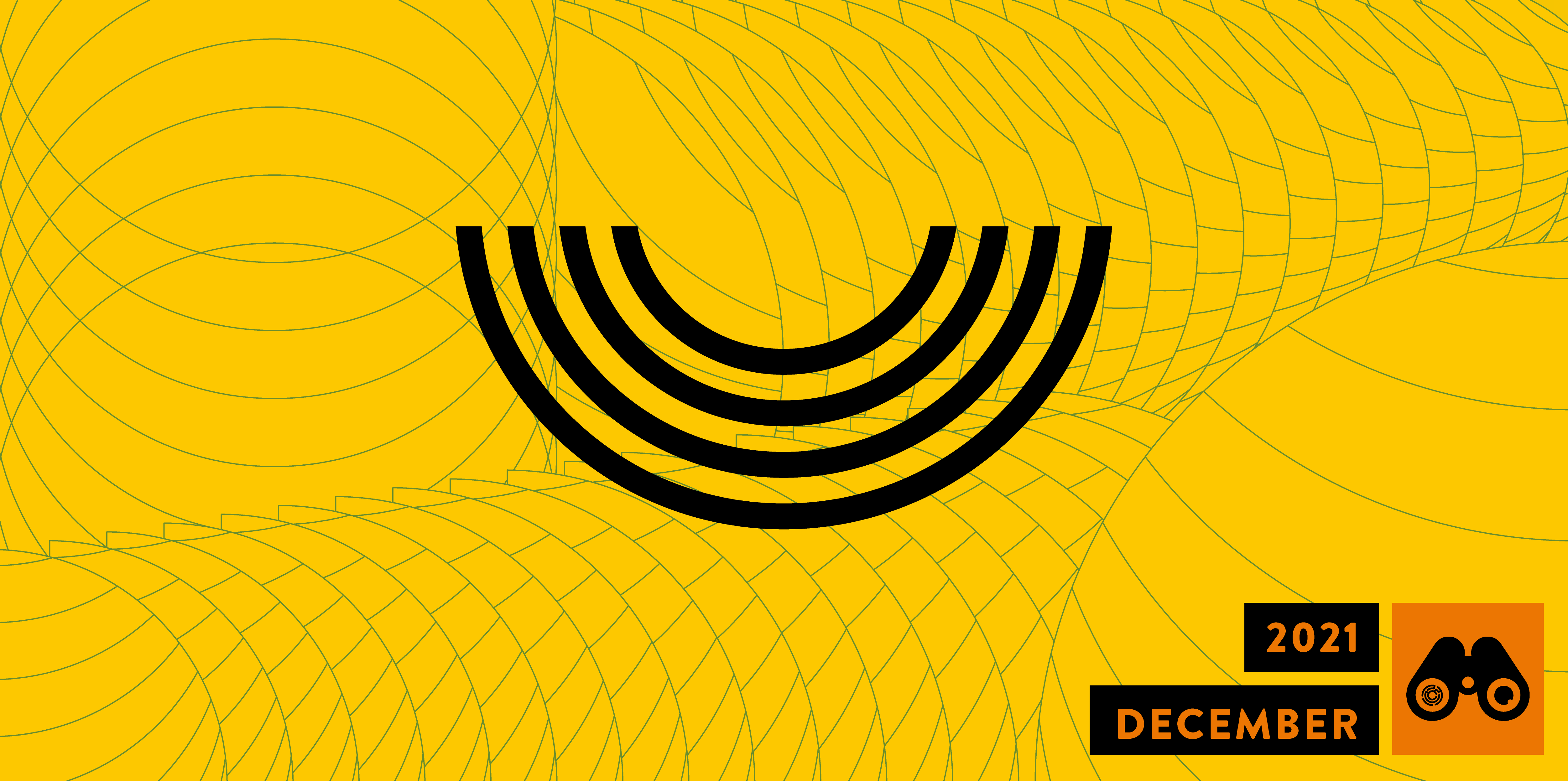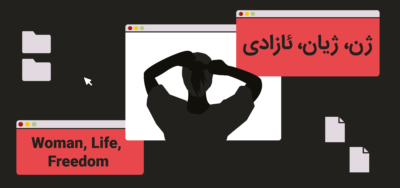The publication of our December 2021 Policy Monitor coincides with the second anniversary of the tragic shooting down of the Ukraine International Airlines Flight 752 — which resulted in the deaths of all 176 passengers and crew on board — by the Islamic Revolutionary Guard Corps (IRGC). The victims of the tragedy are remembered online under the hashtag #IWillLightACandletoo and in Persian under #من_هم_شمعی_روشن_خواهم_کرد, however the hashtag was soon restricted by Instagram for ‘not meeting [its] community guidelines.’ The restriction was later lifted and said to be a ‘mistake,’ according to Instagram’s parent company, Meta (Facebook). Our January 2022 report will include more details on this incident.
In December, Iran’s ICT Ministry, Eisa Zarehpour, attended a public session at the Parliament to set out his Ministry’s priorities. Meanwhile, the Supreme Council for Cyberspace held a meeting to discuss satellite internet services. The dangerous “Online Services Bill” also made headlines yet again, though the Bill’s final approval appears to remain some distance away.
Our monthly Network Monitor supplements this report with the latest on internet disruptions in Iran.

Supreme Council for Cyberspace Holds Meeting Chaired by President Ebrahim Raisi
On 21 December, the Supreme Council for Cyberspace (SCC) held a meeting chaired by President Ebrahim Raisi. The Council discussed the resolutions on the ‘Expansion of Digital Services’ and the ‘Requirements for Dealing With Satellite Internet Services.’ The text for the two new resolutions have not yet been published by the SCC as they do not appear to have received final approval during the session. Previous SCC sessions have also focused on satellite internet services. As Filterwatch has already written, these services are unlikely to bring unrestricted access to the global internet for Iranians as the SCC works
During the session, the SCC approved the creation of an ‘Online Media Headquarters’. While organisations who are members of this group are required to “share and exchange online information”, limited details are available as to the membership, aims and objectives of this headquarters.
Latest Developments Around the Dangerous ‘Online Services Bill’
On 27 December the Parliamentary Joint Special Committee responsible for reviewing the ‘User Protection and Core Online Services’ (commonly known as طرح صیانت in Persian and hereafter referred to as the ‘Online Services Bill’) held its 11th session. The session was held following the decision to refer the Bill to the Parliamentary Research Centre (PRC) for review, in light of the ICT Ministry’s comments and recommendations on the Bill in November 2021, which were not made public. The PRC published a response on its website on 22 December asking for more time for review due to the Bill’s ‘extensive problems’ citing examples such as ‘various conflicts with the Constitution and existing policies, lack of transparency in the legislative and review process, weakening investment security, insufficient consideration to technical aspects of internet gateways and online services, encouraging the migration of talent’. The PRC’s public communication of their response letter via their website drew criticism from its Chair and members of the Special Committee during the session, who also voiced their disagreement with the PRC’s comments on the contents of the Bill.
Also during the session a new draft of the Bill dated 26 December 2021 was announced along with a further name change: The latest draft of the Bill is now referred to as the ‘Regulatory System for Online Services Bill’ (Persian: طرح نظام تنظیم مقررات خدمات فضای مجازی), though Filterwatch will continue to refer to the Bill as the “Online Services Bill” for consistency.
The latest draft of the Bill is not substantively different to its previous versions, though some minor changes were introduced. However, the Bill is subject to further change, as the next day – on 28 December – the Committee agreed to return the Bill to the PRC for 20 days to allow for further time for review. In its current form, the ‘Online Services Bill’ among other things, would increase state control of international services and military control over the domestic internet infrastructure. The proposed measures pose a number of significant dangers to digital rights in Iran, including the likelihood of mass surveillance, while not offering any meaningful data protection measures for Iranians. Filterwatch will continue to monitor the developments surrounding the Bill and will provide further updates in future editions of the Policy Monitor.
Iran’s ICT Minister Appears at a Public Session in Parliament
On 7 December Iran’s ICT Minister, Eisa Zarehpour, appeared at a public session in Majles (parliament) to respond to a report by the Parliamentary Industry and Mines Committee on the ICT Ministry’s performance. During the session, Zarepour made a number of comments on the Ministry’s objectives under the current administration:
- Progress on the National Information Network (NIN) is one of the highest priorities for the Ministry and is being monitored at weekly meetings by the newly created ‘Steering Council for the Development and the Implementation of the NIN’ at the ICT Ministry.
- The Ministry is aiming for domestic internet traffic use to overtake international traffic use. International internet traffic consumption in Iran is currently higher than domestic internet traffic. According to Zarepour, however, during the previous Iranian calendar year (March 2020 – March 2021) 75% of internet traffic was internationally route, however, Zarepour claims that this figure has dropped to 65% in the current year, underlining the aim for domestic internet traffic usage to overtake international internet use.
- Zarepour argued further Infrastructural investment and expansion is needed. Hecommented that a budget of 500,000,0000,000 IRR (118.273.000 USD) is required for fibre optic projects, as well as further data centres in five areas of the country. He added that overall infrastructural capacity is to double in the next year while fiber optic capacity needs to triple.
- The Ministry plans to expand internet access to 7,500 villages with the population of over 20 families by the end of the next Iranian calendar year (March 2022 – March 2022).
While the new government has been highly critical of the ICT Ministry during President Rouhani’s time in office, the NIN made significant progress during the past eight years despite financial, technological and political limitations. Zarepour’s ICT Ministry appears to be on track to continue the progress made by previous government administrations, though some financial limitations and constraints still remain, he is likely to face significantly fewer political obstacles in his path.
Spokesperson for the National Centre for Cyberspace Announced
On 15 December the Head of the National Centre for Cyberspace (NCC) and Secretary to the SCC Abolhassan Firouzabadi appointed Amir Khorakian as the Spokesperson for the NCC. Khorakian also holds the position of Deputy for Legal and Parliamentary Affairs at the NCC.
Deadline for the Repayment of Government Loans to Iran’s Domestic Messaging Apps Extended
On 21 December the ICT Ministry agreed to extend the repayment deadline for loans given to domestic messaging apps, such as Gap, iGap, Soroush, and Bale, by six months. These government loans were given out in 2018 and 2019 as part of the government’s policy to support domestic messaging apps.
Despite Iranian domestic messaging apps being branded by some Iranian officials as ‘failures’ given their low user adoption, especially compared to their international counterparts, they remain an integral part of Iran’s system of internet controls and the National Information Network (NIN).

ICT Ministry Official: National Information Network’s Bandwidth Capacity to Increase to 20 Terabit per Second
On 31 December, in an interview, the Head of Iran’s Telecommunication Infrastructure Company (TIC) and Deputy ICT Minister, Hamid Fatahi, announced that the bandwidth of the NIN “is set to increase to 20 Tb/s” according to plans for the next Iranian calendar year (March 2022 to March 2023).
Fatahi was also asked about the heavy internet disruptions experienced by Iranians in recent months, which some news outlets and ISPs reported as being caused by ‘the SCC’s refusal to issue a license to the TIC for the purchase of international bandwidth.’ Fatahi denied these reports and added that ‘normal protocol’ for meeting bandwidth demands was being followed.
Iranians experienced extensive internet disruptions at the end of 2021, especially when accessing VPNs and Instagram, which is one of the few remaining international platforms not blocked by Iranian authorities. Officials have mostly remained silent on the matter or denied any network disruptions, especially around throttling international internet traffic speeds which has been documented in our previous Network Monitor reports.
Irancell and Kermanshah City Council Sign an Agreement for ‘Smart City’ Services
On 28 December, mobile network provider Irancell and Kermanshah City Council – the provincial capital of Kermanshah Province – signed an agreement for the expansion of fiber optic cables and infrastructure required for Smart City services, which refers to the use of data and digital services, in order to optimise the efficiency of public space management and public services—everything from traffic and transportation to utilities and waste management to schools and hospitals.
Smart City planning has been on policy agendas at national and local levels. Filterwatch will be publishing a subsequent report on the implications of Smart City developments on citizens’ privacy and security.

Iran’s ICT Minister Joins Domestic and International Social Media and Messaging Platforms
On 13 December, the Head of Communications at the ICT Ministry, Jamal Hadian confirmed in a tweet that the ICT Minister, Zarepour had joined a number of domestic and international social media and messaging platforms, including Instagram and Linkedin—in addition to domestic apps such as Bale, Eita, Soroush, Rubino (part of Rubika), Gap and iGap.
Zarepour had received criticism and questions from MPs over his lack of presence on social media platforms in August 2021 during the confirmation process for his appointment as ICT Minister. He responded then that he did not have an ‘official’ presence on social media and prefers to use his role to ‘connect people’. He added that he didn’t ‘have time’ for social media. Zarepour has notably refrained from having an official account on Twitter – which is blocked for ordinary users in Iran but was favoured by his predecessor, Jahromi – stating that he will not be joining a platform ‘prohibited by law.’
Two of Iran’s Largest Mobile Network Operators Ordered to Pay Fines for ‘Blocking Clubhouse’
On 18 December, Iran’s Administrative Court upheld the fine issued in early 2021 by the previous government against two of the country’s largest mobile network operators – Mobin Trust Consortium, who are Hamrah-e-Aval’s (MCI) shareholders, and Irancell – in relation to filtering the audio-only chat room app, Clubhouse.
The decision comes following a surge in Clubhouse’s popularity especially among Iranian users in early 2021. However, in April 2021 Irancell and MCI users reported that they were unable to access the app without a VPN, indicating that the app was blocked. Following the reports, the ICT Ministry and the Communications Regulatory Authority (CRA) asked for the two operators to produce a judicial order for the blocking of the app on their networks, failing to produce evidence of such an order, to restore unrestricted access to the app to their users. Due to the two networks’ failure to produce the order, a fine was issued against them by the Cabinet under the Rouhani administration in late April, which the two networks appealed.
The decision to uphold the fine means that the two networks must pay a fine of up to 500,000,000 IRR (118,232 USD) per day. The networks have 20 days to appeal the court’s decision. In April 2021 an informed source told Filterwatch that Herasat (security offices) at MCI, Irancell, and TCI pushed for blocking the app at the DNS leve – who as of this writing are still blocking it – though no government authorities publicly took responsibility for the decision. It is also worth noting that MCI is the owner of the Iranian social media ‘super app,’ Rubika, which also added audio-only chat rooms to its functions last year.

Iranian E-Commerce Platform Hit by ‘Cyberattack’
On 20 December the Head of Communication and Marketing at the Iranian e-commerce platform, Basalam (Persian: باسلام), Amir-Ali Sabour, stated in a tweet that the platform was experiencing a ‘cyberattack.’ According to a statement later published by Basalam, around 30,000 users were impacted however there is no mention of whether personal or sensitive user data has been compromised.
Cyberattacks continue to be common for Iranian platforms and government bodies who have in recent months reported a number of attacks on their critical infrastructure.

Iranian Mobile Phone Manufacturer GLX Reveals New Phone Model
On 26 December, Iranian mobile phone manufacturer GLX revealed its latest model of mobile phones: Shahin III (Persian: شاهین۳ ). Shahin III is the first Iranian made and one of the cheapest 5G enabled mobile phones, according to GLX. The phone is set to be sold throughout the Middle East, according to GLX’s Director Hamid Saedi.
Iran’s domestic mobile phones play an important role in the implementation of ‘layered filtering’ in Iran, which is set to create a system which gives different levels of access to the global internet as decided by the government.




